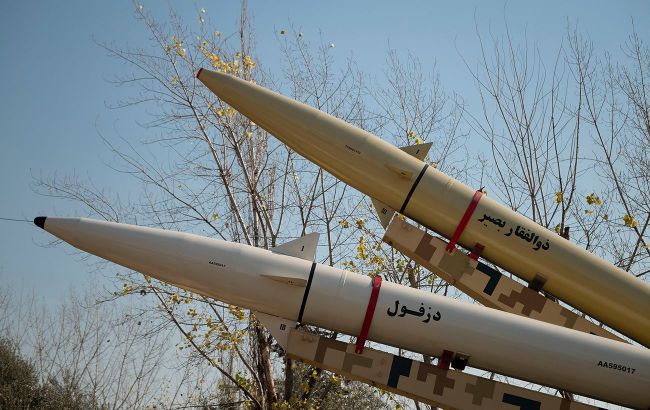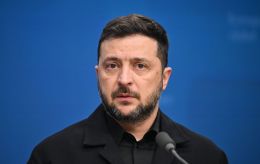Could Russia obtain ballistic missiles from Iran, expert's opinion
 Photo: Expert assesses whether Russia can obtain ballistic missiles from Iran (Getty Images)
Photo: Expert assesses whether Russia can obtain ballistic missiles from Iran (Getty Images)
Sanctions and UN resolutions are unlikely to prevent Iran from transferring its missiles to Russia, should Tehran decide to take such a step. However, there are other obstacles that may still hinder this process.
Defence Express expert Ivan Kyrychevskyi commented on the possibility that Russia can obtain missiles from Iran and what might impede it.
Will sanctions help?
You may have heard about the ongoing conflict in Yemen, where Houthi rebels, supported by Iran, are fighting. No UN resolutions or sanctions seem to deter Iran from supplying ballistic missiles to the Houthis.
Our sanctions regime against Russia is based on bureaucratic regulation. There is a full-fledged classic maritime blockade in place, with Western countries' ships patrolling and trying to intercept vessels carrying various contraband weapons from Iran to Yemen, ranging from rifles and ammunition to anti-tank rockets and components of ballistic missiles. Iran manufactures these missiles, then carefully disassembles them and transports them in various batches on different ships.
Even such restrictive measures have not prevented the Houthis from acquiring a wide range of Iranian offensive capabilities. They have Shahed-136 drones that fly to Saudi Arabia, as well as primitive copies of Soviet Kh-55 missiles, and even ballistic missiles with a range of up to a thousand kilometers.
The irony of the situation with Iran and its support for the Houthis is that, on the one hand, Iran claims it wants to reconcile with Saudi Arabia, but on the other hand, it continues to provide weapons to the Houthis. This raises a logical question: if Iran is not hindered from selling missiles in such sensitive regions as the Persian Gulf, why did we assume that Iran is such a compliant participant in the world order that only a UN resolution would prevent it from giving missiles to Russia?
Strange missile selection
In October of last year, reports first emerged about Fateh-110 and Zulfaghar missiles. If you look at the design of these missiles, they use specific launch systems. So, it turns out that the Russians not only need to deal with missiles they have never used before but also with launch systems, which means retraining personnel. This is despite the fact that Iran has more familiar Russian and Soviet military products, including its own copies of missiles for the Iskander-M system, also known as Skad.
Any missile, whether ballistic or cruise, requires its own maintenance infrastructure. It's better to acquire a missile for which you can mobilize experts because someone has already served on it, among other reasons. This is preferable to a missile you're seeing for the first time in your life.
Relations between Iran and Russia
We have an outdated model of the world where Russia is all-powerful and everyone else is just trying to appease it. In our worldview, Iran should ignore its own interests and not wage war in Saudi Arabia. Missiles don't appear out of thin air. If we consider the information that came from Western intelligence, speaking about money, Iran literally asked Russia for planes of cash for the first batch of Shaheds. Ballistic missiles aren't produced quickly. How can you sell something that is invaluable to you?
Moreover, Russia and Iran have a complex history of relations, with many inequalities. It seems paradoxical that Iran agreed to supply Shaheds to Russia, considering this context.
I wouldn't claim that Russia will never obtain missiles from Iran. But currently, as of today, there's no reason to expect that Russia will receive all these ballistic missiles from Iran because the nature of their relationship is not that straightforward.
If Russia were in a strictly subservient role, like the Yemeni Houthis, maybe there would be cause for concern. But another factor that suggests Russia is trying to leverage its ballistic missiles - first, the pace of ballistic missile production in the Russian Federation, especially compared to last year, has increased several times. If in January 2023, production was estimated at up to 5 ballistic missiles and one or two cruise missiles, now in August, the General Staff of the Ukrainian Armed Forces was talking about 30 ballistic missiles and 12 cruise missiles per month.
Moreover, there is a story that Russian propagandists told. The Russian military-industrial complex is working on a project to convert the S-400 anti-aircraft missiles into ballistic missiles.
But Russians do not hide the fact that Iranians are selling them means for general-purpose combat - rocket projectiles for Grad systems, or anti-tank missiles. The fact that Iran is willing to sell such things to Russia is the problem.

